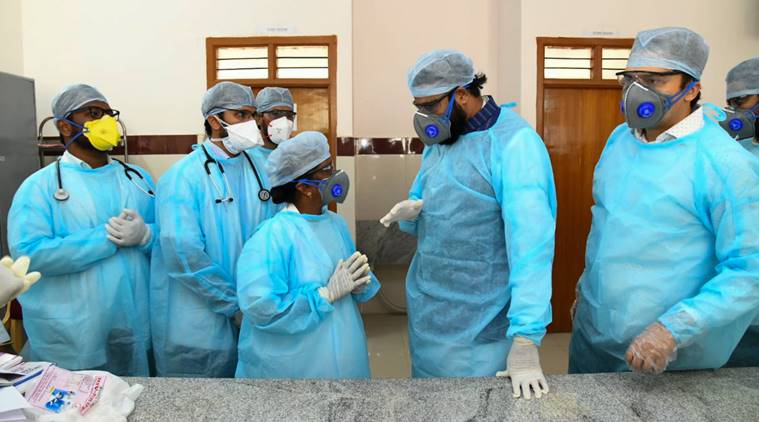 Karnataka Health Minister B Sriramulu wearing full safety dress interact with doctors at the isolation wards of GIMS Hospital, in Kalaburagi on Sunday. (ANI Photo)
Karnataka Health Minister B Sriramulu wearing full safety dress interact with doctors at the isolation wards of GIMS Hospital, in Kalaburagi on Sunday. (ANI Photo)
In an effort to raise the state’s preparedness in tackling any fresh bout of Covid-19 outbreak, the Karnataka government has started creating a health register of citizens with specific focus on identifying people above the age of 60 with underlying health problems.
Survey work to gather data for the register has begun across the state at the election booth-level — state officials, carrying area voters’ lists, are at present going house to house to find out about elderly persons in each household in the jurisdiction of a particular election booth.
The aim of collecting data for the health register, state officials said, is to ensure quick identification of people at high risk of being affected by Covid-19 in case the virus s to new localities outside the existing red zones.
An audit of 17 of 31 coronavirus deaths in Karnataka has revealed that those above the age of 60 with comorbidities have mostly been victims of the virus.
In a circular titled “Surveillance plan to check spread of Covid 19 virus”, state Health Commissioner Pankaj Pandey has stated: “Early detection of Covid-19 (cases) and persons having ILI/SARI/Covid 19-like symptoms, their treatment and segregation from others are essential. The purpose of the survey is to identify high-risk households, to build capacity to reach households without sending a health worker or any other government functionary.”
“COVID-19 has demonstrated that comprehensive public health data is the key to act decisively and swiftly. Our government is planning to maintain a ‘Health Registry of Citizens’,” state Medical Education Minister Dr K Sudhakar recently stated on social media.
Until now, the Health Department has carried out risk-assessment surveys of areas with Covid-19 patients after cases were detected, which, in many instances, set off attacks on health workers by local residents.
The fresh health risk-assessment and outreach survey, which is on since May 5, is collecting data specifically on those above the age of 60; people above 60 with cardiac, high blood pressure and diabetes problems; pregnant women in each household; and people with fever, breathing problems, cough and cold.
While those reporting fever and breathing problems will be contacted immediately by health workers, others will be monitored in the event of a coronavirus outbreak in their locality, officials said. Camps of migrant workers will also come in the purview of the survey, with each camp considered a household.
Pointing out that this is a household-level survey, the Health Commissioner said, “No details of individuals other than the head of a household are collected.”
A household heath risk assessment app has been developed, which links households to an election booth area to assess people’s health once the health register is compiled.
Karnataka reported 63 confirmed cases of coronavirus on Tuesday — a single-day high so far in the state — taking the total number of cases in the state to 925.